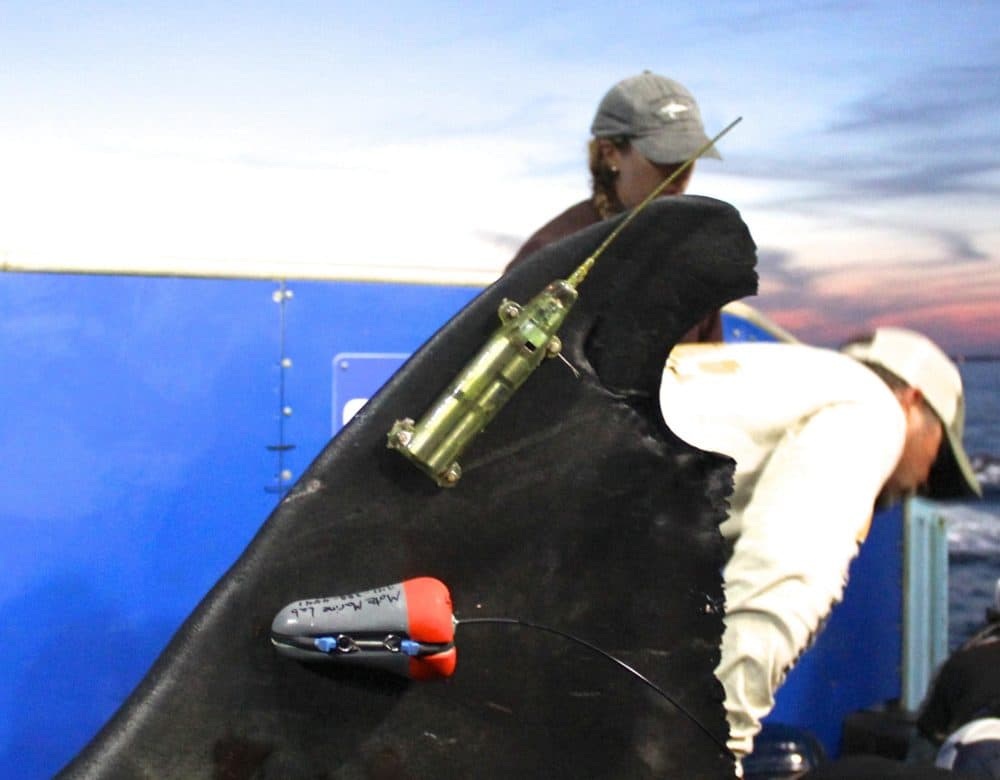Advertisement
Up Close And Personal With Chatham's 'Shy' Great Whites
When great white sharks appear in Cape Cod, most people stay out of the water. Not Chris Fischer. Fischer is the expedition leader of OCEARCH, a team that just spent two weeks off the coast of Chatham with Massachusetts scientists reeling in these giant predators — alive.
"These things are so big that scientists have never had the opportunity to get their hands on a mature specimen and let it go alive," Fischer said.
Gathering More Information
Fischer and his team, who are featured on the TV show Shark Wranglers, use a relatively new method of catching these wild sharks that allows the team to bring them in alive.
"Back in the day, when they wanted to learn about sharks like this they had to put out a long line and take them all," Fischer said. "We're fortunate now that we have the technology where we can make these massive leaps forward in knowledge and have minimal impact as far as the number of sharks we handle and any sort of mortality rate."
Fischer estimates that in five years they've caught between 80 and 100 sharks, and lost just one.
The crew uses bait to draw a shark in and hook it. Then the shark is reeled onto a lift that hangs from the side of a research boat. The lift is then brought out of the water with the shark still on it.
"We pick the shark up out of the water, put a towel over its eyes, put hoses in its mouth to keep water going over its gills," Fischer explained. "Then we proceed to handle all the science projects we need to handle, gather all the samples we need to gather."
Advertisement
The process of collecting blood and tissue samples takes about 15 minutes. The lift is then lowered back into the water and after the shark reorients itself in the water it swims away.
"Then we track 'em."
'Very, Very Wild White Sharks'
"The white sharks there off Cape Cod don't appear to be exposed to any sort of cage diving operations or areas where they're used to being around boats," Fischer said.
Fischer says Cape Cod has the fewest sharks out of all the places he's worked. In South Africa and Mexico, where the crew often works, sharks are used to having boats around.
"That seemed to make the [Cape Cod] sharks very shy. They're just very, very wild white sharks. They're not as likely to come up and investigate boats, and come up and take a bait," Fischer said. "So it was the most challenging situation we've ever faced from that perspective and from the sharks are all spread out over an area and they're not just as many of them."

The GPS trackers researchers attach to the sharks "ping" every time the shark breaks the surface and sends that information to a website where anyone can see their whereabouts.
During the Cape Cod expedition, Fischer and his team caught and tagged two female sharks, Genie and Mary Lee, a big accomplishment according to Fischer.
"If you're only going to catch two sharks, you want to catch two females," Fischer said.
The data will help scientists not only find the shark's breeding ground, which you could find by tagging male sharks, but also their nursery. Chris Fischer thinks that Cape Cod could prove to be very important to the future of these top predators.
"I will tell you that I have a $1 bet with Dr. Greg Skomal [of the Massachusetts Division of Marine Fisheries] that we will learn in the future that Cape Cod is a great white shark breeding ground," Fischer said. "I have no data, but in two years we'll know."
Fischer points to other sharks tagged in the northern hemisphere who are breeding at the same time that great white sharks show up off Cape Cod's shores.
This program aired on September 21, 2012. The audio for this program is not available.